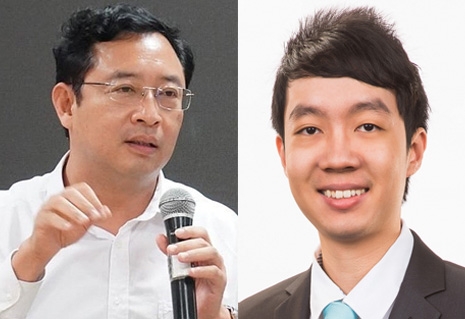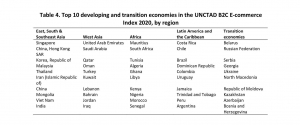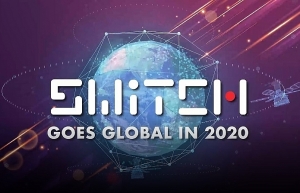NATEC and Enterprise continue cooperation to unlock Vietnam's innovation potential
 |
| Pham Hong Quat, director general, NATEC and Leon Cai, regional director (Ho Chi Minh City), Enterprise Singapore |
The Vietnamese agency (NATEC) and Enterprise Singapore (ESG) have renewed their cooperation for another two years. What will be the focuses in the next stage? How will it benefit the innovation landscape for Singapore and Vietnam?
Pham Hong Quat: Singapore is considered to be the hub of innovation as well as a “paradise” for startups, with startup-friendly policies including subsidies and a range of incubation schemes. With its advanced IT infrastructure, strong government support, intellectual property laws, and deep tech talent pools, Singapore has become a world-leading technology innovation centre.
Thus, the cooperation between NATEC and ESG will provide an open space for best practices and know-how sharing, particularly on the crafting and execution of startup and innovation supporting policies, as well as building and operating startup hubs.
Through market access programmes and joint events, Vietnamese startups will have a chance to experience and benefit from peer-to-peer learning with their counterparts. Operating in the world’s leading and most vibrant ecosystem, Singaporean startup founders and teams have admirable skills and qualities, for example, creative thinking; entrepreneurship and management skills; fundraising and management; as well as research and development (R&D). Moreover, there will be a high chance that our startups can find great partners or clients in a new market.
One of the biggest concerns for Vietnamese startups might be how to get funding from venture capital funds or angel investors and how to manage them wisely, especially during the crisis. Thus, what they need to focus on is acquiring valuable know-how and skills from their counterparts and taking any opportunity to interact and learn from experienced investors and mentors.
Leon Cai: The renewed MoU will build on existing partnerships between Vietnam and Singapore to facilitate collaborations for startups, ecosystem builders, and the tertiary institutions of both countries, especially in strengthening the global innovation communities’ access to Vietnam’s startup landscape, connecting startups from Vietnam to major technology hubs, and facilitating venture capital activities. In addition, the renewal will have an additional focus on leveraging existing open innovation initiatives such as the Singapore Open Innovation Network to crowd-source solutions for corporates in Vietnam. ESG will also share best practices with NATEC to develop similar open innovation platforms for Vietnam, among other initiatives.
Trade and business links between Vietnam and Singapore have been robust ever since the countries established bilateral diplomatic relations back in 1973. In recent years, we have observed growing interest from Singaporean companies in Vietnam’s technology and innovation sector. With this renewed memorandum, we hope to build a vibrant ecosystem, leveraging the strengths of different innovation players from both countries to create an environment that enables startup and corporate partnerships, and catalyses business transformation and economic growth.
How important s Vietnam's startup and innovation scene to the rest of ASEAN, the world, and to Singapore? Has there been any changes over the past five years in this regard?
Pham Hong Quat: The Vietnamese government started to pay attention and set up initiatives to build and support the startup ecosystem since 2016 with the National Programme to Support Innovative Startup Ecosystem in Vietnam until 2025, also known as National Programme 844. Since 2017, Vietnam has emerged as a hub for startups, closely competing with Indonesia and Singapore. In the first half of 2019 for instance, Vietnamese startups raised $246 million with startups such as Tiki, VNPay, and VNG capturing 63 per cent of these deals. The first half of 2020 witnessed a 22 per cent reduction in deals compared to the same period in 2019, owing mainly to the economic impact of COVID-19. However, fundraising by Vietnamese startups has shown signs of recovery in the second half of 2020.
To encourage entrepreneurship, the Vietnamese government has established a number of funds at state and provincial/city level to support startups.
Our ecosystem is booming and emerging and in only two years Vietnam jumped from the second-least-active startup ecosystem among the six largest ASEAN countries (Indonesia, Vietnam, Thailand, Malaysia, Singapore, the Philippines) into the third rank, trailing behind only Indonesia and Singapore, according to Southeast Asia-focused venture capital firm Cento Ventures.
Vietnam, driven by its growing internet penetration, smartphone adoption, and young demographics, offers huge potential for startups, especially ones focusing on fintech, e-commerce, and enterprise solutions. These sectors have attracted significant portions of funding in the last year. Other emerging sectors include education technology, agri-tech, and logistics.
Leon Cai: In the past five years, from 2015 to 2020, there has been an exponential increase in deal counts and investments into Vietnam, compared to the five years before then. Regulatory changes, too, have been passed in Vietnam to make it easier for startups to access tech from aboard. National agencies such as NATEC and innovation centres across Vietnam have been established to champion innovation. These are indicators that venture capitalists welcome and boost confidence among investors. Vietnam has risen significantly in 2019’s Global Innovation Index rankings.
Within ASEAN, Vietnam is one of the top three innovative nations, together with Indonesia and Singapore. As a whole, Southeast Asia has built a strong reputation in the innovation scene, with 13 unicorns groomed here. The region has also been attracting a significant number of global investors. According to DealStreetAsia, one of the biggest funds that closed this year in the region is global venture capital firm B Capital Group with more than $700 million that focuses on Southeast Asia.
What lessons should Vietnam learn from Singapore to develop its startup and innovation ecosystem? Which best practices will ESG share with NATEC to develop similar open innovation platforms for Vietnam?
Leon Cai: ESG has been working with public and private partners in Singapore to grow our open innovation ecosystem. As open innovation involves a “win-win” partnership between larger corporates and innovative startups and SMEs, these efforts include setting up the Singapore Open Innovation Network, which is a national gateway to aggregate all open innovation challenges out of Singapore, and the Startup SG Network featuring local startups and ecosystem partners. Most of the innovation calls are open to global solution providers and startups to apply. ESG also collaborates with foreign partners on international co-innovation programmes such as the EUREKA GlobalStars-Singapore call and the recently-launched inaugural Southeast Asia Open Innovation Challenge.
Under the renewed MoU, we look forward to more opportunities to work with NATEC to facilitate exchanges between startups, corporates, investors, and other ecosystem players from Vietnam and Singapore, leveraging on existing initiatives such as the Singapore Open Innovation Network or through new collaborations like the Southeast Asia Open Innovation Challenge.
Pham Hong Quat: Business-incubating infrastructure, tax incentives, cash grants, or financing schemes are outstanding government support initiatives from Singapore that push the ecosystem to the next level and those best practices are what we desire to learn.
Most importantly, we are impressed by the way they form public and private partnerships in open innovation – a global phenomenon and our focus in the past few years. We believe that this is an appropriate approach to build up sustainable ecosystem as government funding and supports are limited while there are a lot of opportunities from the private sector. By creating an open innovation platform where the government plays a role as facilitator, we can draw private resources into startup support activities on a sustainable win-win basis.
We are positive that the renewed MoU will bring more impacts and benefits to the startup ecosystem of the two countries via a number of detailed activities such as market access and exchange, joint pitching sessions, capacity building, and open innovation platform.
What successful tie-ups have there been between startups and corporations under the MoU? What are your future expectations?
Leon Cai: ESG and NATEC signed the MOU at the sidelines of TechFest 2018 in Danang, Vietnam on November 30, 2018 to facilitate collaborations for startups, ecosystem builders and tertiary institutions between both countries.
Over the past two years, the MoU has supported a number of initiatives:
- Strengthening the global innovation communities’ access to Vietnam’s startup landscape. NUS Enterprise, the entrepreneurial arm of the National University of Singapore (NUS), partnered Becamex IDC Corporation to launch ecosystem builder BLOCK71 Saigon in October 2020. As an entrepreneur enclave of startups, venture capitalists, and incubators, BLOCK71 Saigon connects Vietnam’s innovation players with a network of mentors, global tech talents, and resources from corporates and government agencies;
- Connecting startups to major technology hubs. BLOCK 71 augments the efforts of Enterprise Singapore’s Global Innovation Alliance (GIA) in Ho Chi Minh City, a partnership with Saigon Innovation Hub (SIHUB) and Singapore-based venture fund Quest Ventures that was launched in 2019. GIA is a network of global innovation hubs which Vietnam’s ecosystem players can tap on to access the latest R&D efforts, whilst familiarising the global startup community with market demands unique to Vietnam. More than 10 Singapore-based startups from various sectors participated in the first run of the GIA HCMC market immersion programme, which concluded recently with a number of participating startups in discussion for partnerships or pilot projects with Vietnamese partners; and
- Facilitating Venture capital activities. We have observed more fund raising activities from Singapore-based venture capital firms looking to invest in Vietnam’s fund and startups. Sea Group and Vertex Holdings invested in the recently launched Do Ventures fund, targeting Vietnamese startups. Other noteworthy fund-raising activities include Singapore companies, Insignia Ventures Partners, and TRIVE investments into Vietnamese technology companies Logivan and CoderSchool, respectively. Singaporean edtech startup Kalpha also raised seed funding from Vietnam-based VC Nest Tech VN.
Moving forward, we hope to facilitate more co-innovation partnerships between startups and corporates. One example is the ongoing Southeast Asia Open Innovation Challenge that was launched at the Singapore Week of Innovation and TeCHnology in December last year. VNG Cloud launched its call to source for partners to co-innovate complementary technologies to support its eKnow Your Customer (eKYC) solution which enables digital banking for banks and financial institutions. The Open Innovation Challenge also saw participation from a number of other regional corporates including Central Group (Thailand), Hong Leong Holdings (Malaysia), Emtek (Indonesia), and Sunway (Malaysia), aiming to leverage Singapore’s business friendly environment, strong infrastructure and proximity to Southeast Asia to co-develop and scale new innovative solutions.
The Vietnamese government has a number of supporting policies for startups. Do you think they are enough to facilitate startup development and lure Singaporean startup and venture funds?
Leon Cai: Policies to support innovation has been remarkable in the last 10 years. At the enterprise level, MoUs such as those between ESG and NATEC further strengthen the role of the business sector in Vietnam’s innovation landscape. Our MoU encourages private and public partnerships, enterprise investments in science and technology initiatives, and expands public support for R&D at firm level by linking Vietnamese enterprises with research institutions.
Efforts to strengthen training and knowledge transfers between research centres, academia, and foreign companies and national science and technology networks will also assure more domestic firms can access the latest technologies and build capabilities to improve on productivity and quality benchmarks.
These efforts make Vietnam an attractive investment for Singaporean companies.
What the stars mean:
★ Poor ★ ★ Promising ★★★ Good ★★★★ Very good ★★★★★ Exceptional
Themes: Digital Transformation
- Dassault Systèmes and Nvidia to build platform powering virtual twins
- Sci-tech sector sees January revenue growth of 23 per cent
- Advanced semiconductor testing and packaging plant to become operational in 2027
- BIM and ISO 19650 seen as key to improving project efficiency
- Viettel starts construction of semiconductor chip production plant
Related Contents
Latest News
More News
- Hermes joins Long Thanh cargo terminal development (February 04, 2026 | 15:59)
- SCG enhances production and distribution in Vietnam (February 04, 2026 | 08:00)
- UNIVACCO strengthens Asia expansion with Vietnam facility (February 03, 2026 | 08:00)
- Cai Mep Ha Port project wins approval with $1.95bn investment (February 02, 2026 | 16:17)
- Repositioning Vietnam in Asia’s manufacturing race (February 02, 2026 | 16:00)
- Manufacturing growth remains solid in early 2026 (February 02, 2026 | 15:28)
- Navigating venture capital trends across the continent (February 02, 2026 | 14:00)
- Motivations to achieve high growth (February 02, 2026 | 11:00)
- Capacity and regulations among British areas of expertise in IFCs (February 02, 2026 | 09:09)
- Transition underway in German investment across Vietnam (February 02, 2026 | 08:00)





 Tag:
Tag:
























 Mobile Version
Mobile Version